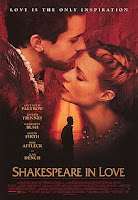 I love screenwriting. I love writing scripts, reading them, and reading about them — and the screenwriters behind them.
I love screenwriting. I love writing scripts, reading them, and reading about them — and the screenwriters behind them.So finding this book was like Christmas coming early. Weighing in at nearly 500 pages it is a big, juicy read devoted entirely to the screenwriting contingent in Hollywood.
And, best of all, it is written by a screenwriter. And a major one at that. Marc Norman's Oklahoma Crude is now pretty much forgotten, but at the time the script sold for a record sum.
More recently his screenplay for Shakespeare In Love won an Oscar — admittedly after a rewrite by Tom Stoppard.
But, as Andrew Kevin Walker (Seven) remarked of a similar experience on Sleepy Hollow, if you're going to be rewritten, that's the guy you want to be rewritten by.
Anyway, Marc Norman's splendid What Happens Next is a feast of fact, opinion and anecdote.
And, not unexpectedly, a lot of the book is devoted to the, ahem, tension between writers and directors about who is really responsible for creating a movie. In particular the mendacious "auteur" theory can be seen coming over the hill in the 1950s like the Chinese army launching an attack during the Korean police action.
 Just to give one example, Frank Capra directed nine classic films written by Robert Riskin. But as soon as Riskin was safely dead Capra made a massive credit grab, claiming he was the sole author of his output. Marc Norman writes that Capra "seized the newly hatched auteur theory like someone clutching a governor's reprieve."
Just to give one example, Frank Capra directed nine classic films written by Robert Riskin. But as soon as Riskin was safely dead Capra made a massive credit grab, claiming he was the sole author of his output. Marc Norman writes that Capra "seized the newly hatched auteur theory like someone clutching a governor's reprieve."A supplementary example of this kind of behaviour which comes to mind is Michael Winner and Gerald Wilson. Wilson wrote five of Winner's movies, including some of the most successful. But in Winner's autobiography Gerald Wilson gets mentioned, in passing, about once.
Ah, well. What Happens Next is a great read and a must for anyone interested in screenwriting. It is particularly strong about the evolution of the screenplay in the first days of film. Towards the end of the book Marc Norman unfortunately glosses over more recent developments.
If he'd gone into detail, I suppose the book would have been twice as long.
But I, for one, would have been delighted to read a thousand pages on the subject. Any chance of a sequel, Marc?
 Before I close, as a world class nit-picker I need to point out a few small solecisms in the text:
Before I close, as a world class nit-picker I need to point out a few small solecisms in the text:Leon Uris couldn't have been famous for writing Exodus when Nicholas Ray was looking for a screenwriter for Rebel Without a Cause, because annoying Exodus was published in 1958 and Rebel Without a Cause was released in 1955.
Roger Corman's The Trip is not a biker flick (not a motorcycle in sight).
Simon Moore's brilliant television serial Traffik was was written for Channel 4, not the BBC — but really, that hardly matters since Marc Norman mentions it while giving Simon Moore proper credit for his contribution to the Oscar winning film Traffic.
There is a rather snooty review of What Happens Next which you can read if you want to know more.
But I suggest you just buy the book.
(Incidentally, the writer depicted on the cover is Ogden Stewart and his fascinating story makes him a particularly apt choice.)




No comments:
Post a Comment